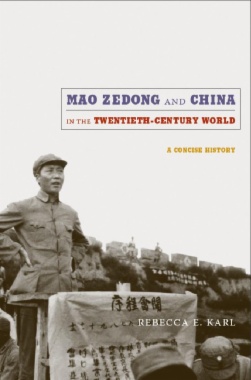Throughout this lively and concise historical account of Mao Zedong’s life and thought, Rebecca E. Karl places the revolutionary leader’s personal experiences, social visions and theory, military strategies, and developmental and foreign policies in a dynamic narrative of the Chinese revolution. She situates Mao and the revolution in a global setting informed by imperialism, decolonization, and third worldism, and discusses worldwide trends in politics, the economy, military power, and territorial sovereignty. Karl begins with Mao’s early life in a small village in Hunan province, documenting his relationships with his parents, passion for education, and political awakening during the fall of the Qing dynasty in late 1911. She traces his transition from liberal to Communist over the course of the next decade, his early critiques of the subjugation of women, and the gathering force of the May 4th movement for reform and radical change. Describing Mao’s rise to power, she delves into the dynamics of Communist organizing in an overwhelmingly agrarian society, and Mao’s confrontations with Chiang Kaishek and other nationalist conservatives. She also considers his marriages and romantic liaisons and their relation to Mao as the revolutionary founder of Communism in China. After analyzing Mao’s stormy tenure as chairman of the People’s Republic of China, Karl concludes by examining his legacy in China from his death in 1976 through the Beijing Olympics in 2008.
- Contents
- Preface and Acknowledgements
- 1. China in the World in Mao’s Youth
- 2. From Liberal to Communist, 1912–1921
- 3. Toward the Peasant Revolution, 1921–1927
- 4. Establishing Revolutionary Bases: From Jinggangshan to Yan’an, 1928–1935
- 5. Yan’an, the War of Resistance against Japan, and Civil War, 1935–1949
- 6. Stabilizing Society and the Transition to Socialism, 1949–1957
- 7. Great Leap and Restoration, 1958–1965
- 8. The Cultural Revolution:Politics in Command, 1966–1969
- 9. The Cultural Revolution: Denouement and Death of Mao, 1969–1976
- 10. Reform, Restoration, and the Repudiation of Maoism, 1976–Present
- Notes
- Bibliography
- Index

